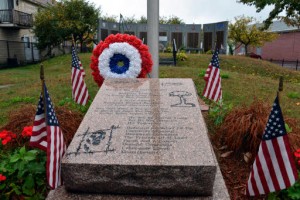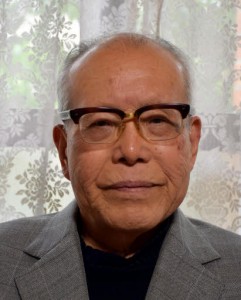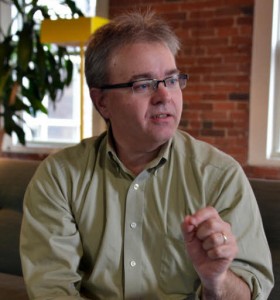A-bomb survivor Shigeaki Mori to visit U.S. for first time in May
Feb. 28, 2018
by Yumi Kanazaki, Staff Writer
In late May, Shigeaki Mori, 80, an A-bomb survivor who lives in Nishi Ward, plans to visit the United States for the first time. Mr. Mori is known for his investigation into the American soldiers who were being held as prisoners of war (POWs) in Hiroshima and lost their lives in the atomic bombing. When former U.S. President Barack Obama visited Hiroshima in 2016, Mr. Mori was involved in an exchange, and embrace, with Mr. Obama. Barry Frechette, 47, a film director who created a documentary about Mr. Mori and the American POWs, is working with others to raise money for Mr. Mori’s trip from people around the world through a crowdfunding campaign.
Mr. Mori and his wife Kayoko, 74, will stay in the United States for about two weeks. On May 28, Memorial Day there, he will go to Lowell, Massachusetts and visit a monument to American soldiers who were killed in the atomic bombing and interact with others, including members of the soldier’s family. He will also take part in a screening of Mr. Frechette’s film, “Paper Lanterns,” in Boston and other cities.
Over the years, Mr. Mori has used much of his own money on international telephone calls and correspondence to trace the fates of the American POWs and the whereabouts of their family members. But because he suffers from a bad back and now has some difficulty walking, he has never before traveled to the United States. Mr. Frechette invited Mr. Mori to come to the United States.
Mr. Frechette grew up in Lowell. He became interested in the issue of the American soldiers who died in the atomic bombing because he lived near the home of Normand Brissette, one of the soldiers who was held in Hiroshima as a POW after his plane was shot down off the coast of the city of Kure in July 1945. Mr. Brissette then perished in the A-bomb attack. Mr. Frechette became acquainted with Mr. Mori, who had been corresponding with family members of the lost soldiers based on the belief that the suffering brought by the atomic bombing affected everyone this event touched in the same ways. The director then traveled to Hiroshima and shot footage of Mr. Mori and local sights. The film was completed prior to Mr. Obama’s visit to Hiroshima and has been well received both in Japan and in the United States.
Mr. Frechette is seeking donations through Go Fund Me, a crowdfunding website. His goal is 20,000 dollars and, so far, about half of this amount has been raised. Reflecting the fact that Mr. Mori had a personal exchange with Mr. Obama, support for his visit to the United States has been broad. Thus, Mr. Frechette said that the trip by Mr. Mori will be realized even if the donations don’t finally meet the goal.
After Mr. Obama, an advocate for a world without nuclear weapons, left the White House, current U.S. President Donald Trump has been seeking to strengthen that nation’s nuclear arsenal. At such times, Mr. Frechette said that he and Mr. Mori would like to highlight the lives of the ordinary people who lost their lives in the atomic bombing. Mr. Mori said, “I want to take advantage of this opportunity to directly convey to the people of the United States what happened in Hiroshima.”
(Originally published on February 28, 2018)
In late May, Shigeaki Mori, 80, an A-bomb survivor who lives in Nishi Ward, plans to visit the United States for the first time. Mr. Mori is known for his investigation into the American soldiers who were being held as prisoners of war (POWs) in Hiroshima and lost their lives in the atomic bombing. When former U.S. President Barack Obama visited Hiroshima in 2016, Mr. Mori was involved in an exchange, and embrace, with Mr. Obama. Barry Frechette, 47, a film director who created a documentary about Mr. Mori and the American POWs, is working with others to raise money for Mr. Mori’s trip from people around the world through a crowdfunding campaign.
Mr. Mori and his wife Kayoko, 74, will stay in the United States for about two weeks. On May 28, Memorial Day there, he will go to Lowell, Massachusetts and visit a monument to American soldiers who were killed in the atomic bombing and interact with others, including members of the soldier’s family. He will also take part in a screening of Mr. Frechette’s film, “Paper Lanterns,” in Boston and other cities.
Over the years, Mr. Mori has used much of his own money on international telephone calls and correspondence to trace the fates of the American POWs and the whereabouts of their family members. But because he suffers from a bad back and now has some difficulty walking, he has never before traveled to the United States. Mr. Frechette invited Mr. Mori to come to the United States.
Mr. Frechette grew up in Lowell. He became interested in the issue of the American soldiers who died in the atomic bombing because he lived near the home of Normand Brissette, one of the soldiers who was held in Hiroshima as a POW after his plane was shot down off the coast of the city of Kure in July 1945. Mr. Brissette then perished in the A-bomb attack. Mr. Frechette became acquainted with Mr. Mori, who had been corresponding with family members of the lost soldiers based on the belief that the suffering brought by the atomic bombing affected everyone this event touched in the same ways. The director then traveled to Hiroshima and shot footage of Mr. Mori and local sights. The film was completed prior to Mr. Obama’s visit to Hiroshima and has been well received both in Japan and in the United States.
Mr. Frechette is seeking donations through Go Fund Me, a crowdfunding website. His goal is 20,000 dollars and, so far, about half of this amount has been raised. Reflecting the fact that Mr. Mori had a personal exchange with Mr. Obama, support for his visit to the United States has been broad. Thus, Mr. Frechette said that the trip by Mr. Mori will be realized even if the donations don’t finally meet the goal.
After Mr. Obama, an advocate for a world without nuclear weapons, left the White House, current U.S. President Donald Trump has been seeking to strengthen that nation’s nuclear arsenal. At such times, Mr. Frechette said that he and Mr. Mori would like to highlight the lives of the ordinary people who lost their lives in the atomic bombing. Mr. Mori said, “I want to take advantage of this opportunity to directly convey to the people of the United States what happened in Hiroshima.”
(Originally published on February 28, 2018)










